Global utilities plan to more than double green power capacity
Alliance of utilities formed during COP28 summit in Dubai wants to reach 749GW of green capacity by 2030

Alliance of utilities formed during COP28 summit in Dubai wants to reach 749GW of green capacity by 2030
